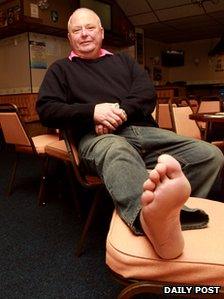Diabetes UK Cymru campaign to reduce limb amputations
- Published

A man who narrowly avoided having his foot amputated because of diabetes is backing a charity's awareness campaign.
Diabetes UK says around 330 diabetes sufferers in Wales are forced to go through limb amputation every year.
It wants to encourage sufferers to become aware of the risks and look after their feet.
Dave Jones from Towyn, Conwy, who nearly lost his foot, said his recovery had been slow and painful and had been "completely avoidable".
The publican told how he woke up one morning, to discover that diabetes-related gangrene had turned his foot black overnight.
He was initially told that he'd lose his lower leg, however it was saved by pioneering grafts of skin from his thigh onto the injured foot.
Diabetes UK Cymru say nerve and circulation damage make limb amputations 20 times more prevalent in sufferers of diabetes than amongst the general population.
Yet the charity believe 80% of the amputations are avoidable, as specialised check-ups to examine feet are not always carried out.
"The latest research shows that between 78% and 84% of people with diabetes are getting annual foot checks but the data we have suggests the picture across Wales is patchy," said the charity director, Dai Williams.
"In some GP practices almost all people with diabetes get an annual foot check, in others less than half get it."
He also said the picture in hospitals was even worse. According to the charity, almost half of those people admitted to hospital with diabetes have complications from active foot disease.
However, only 10% receive a foot examination during the first 24 hours of admission.
But speaking in the charity's Diabetes Week, which aims to improve awareness amongst health professionals and sufferers alike, Dave Jones says patients need to take more responsibility for managing their own condition.
"I used to be the world's worst diabetic. I smoked, drank, ate what I fancied, didn't take my medicine regularly, even lied to the doctors. I just didn't take it seriously," he said.
"If I can do anything to try and persuade even one person not to go down that same road, then hopefully I'll have gone some way towards repaying a tiny bit of the wonderful help and treatment I received.
'Another chance'
"I was so lucky, but even so, my recovery was slow, painful, and completely avoidable in the first place. I've been given another chance.
"When I was lying in bed I thought about what could have happened and the effect on my wife, my 14-year-old daughter and my two step grandchildren. They are why I made the changes and why I want to stay healthy for the future."
A Welsh government spokesperson said: "We aim to ensure that people with, or at risk from diabetes, have access to the highest quality care, including foot care.
"The national service framework for diabetes is being implemented to help achieve this.
"To support health boards, we are developing a diabetes delivery plan.
"This will set out Welsh government expectations of health boards and will identify a set of NHS performance measures for monitoring how effective NHS diabetes care is in keeping people with diabetes healthy and out of hospital, avoiding unnecessary complications such as foot and leg problems."
- Published14 November 2011
- Published5 October 2011
- Published16 January 2012